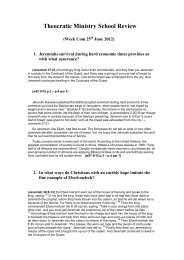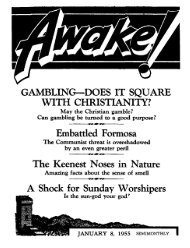1964 Awake! - Theocratic Collector.com
1964 Awake! - Theocratic Collector.com
1964 Awake! - Theocratic Collector.com
You also want an ePaper? Increase the reach of your titles
YUMPU automatically turns print PDFs into web optimized ePapers that Google loves.
junks in order for them to see where they<br />
are going. When laying down the chopsticks<br />
after the <strong>com</strong>pletion of a meal they<br />
are never placed across the rice boWl, for<br />
it is believed that this will cause the vessel<br />
to run aground. Rainbows are treated with<br />
utmost respect, and are never pointed at by<br />
junk people. The finger may be broken as<br />
a penalty for doing so. So it is that these<br />
false religious superstitions at times result<br />
in actual physical harm to the people.<br />
The Junk Today<br />
While many in the Western world may<br />
look upon the junk as a picturesque novelty<br />
of a primitive civilization, sailors who have<br />
had firsthand experience with the junk<br />
recognize its ingenious design and seaworthiness.<br />
One Western sailor wrote recently:<br />
"Nobody could have designed the<br />
Chinese sail, if only for fear of being<br />
laughed at. A device so elaborate and clumsy<br />
in conception, yet so simple and handy<br />
in operation, could have evolved only<br />
through trial and error." But rather than<br />
holding the junk in contempt because of its<br />
unUSualness, he acknowledged the superiority<br />
of its design.<br />
This seaman, Brian Platt, spoke from<br />
experience. He had sailed from Singapore<br />
in June of 1958 on a small cruising yacht<br />
named Ghempaka, but, after a rough trip<br />
through the South China Sea, decided to<br />
have a junk built in Hong Kong for the<br />
rest of his trip across the Pacific to California.<br />
After successfully crossing the<br />
ocean, Platt made this observation: "Com-<br />
paring my experience sailing Chempaka<br />
with that aboard High Tea [the Chinese<br />
junk1 I do not doubt that High Tea was<br />
the better rig. During squally weather in<br />
the South China Sea the handling of ChempakaJs<br />
sails became a real burden and<br />
progress was nil. With the junk rig I<br />
would have gone on much faster with less<br />
labor."<br />
Another sailor, G. R. G. Worcester, after<br />
spending thirty-three years in the Chinese<br />
Maritime Customs, had similar admiration<br />
for the Chinese junk. He explained: "We<br />
sailors of the West owe a debt of gratitude<br />
to the seamen of China. To their countrymen<br />
goes the credit of inventing the watertight<br />
<strong>com</strong>partment, the lugsail, the balance<br />
rudder and many other nautical<br />
devices in <strong>com</strong>mon use today." Few people<br />
realize the contributions made by the<br />
Chinese.<br />
The average Western Visitor to Hong<br />
Kong, however, is not so much interested<br />
in the Chinese contributions to nautical<br />
science as he is in seeing the many picturesque<br />
junks set against the background of<br />
a fading Eastern sunset. While this is still<br />
a sight to be seen, the sails are fast disappearing<br />
from Hong Kong harbor. More<br />
than 4,000 of the colony's 17,000 registered<br />
junks now churn along under diesel power,<br />
enabling them to reach fishing locations<br />
faster and in practically all types of<br />
weather. So changes are taking place, but<br />
the Chinese junk remains an unusual and<br />
picturesque vessel, a maritime wonder of<br />
the Orient.<br />
COLLEGE EDUCATION AND MORALS<br />
V ,"Vhat effect does a college education have on one's morals? Does it strengthen<br />
one's appreciation of Christian principles, or does it undermine morality? The<br />
New York Times of March 14, <strong>1964</strong>, reported: "A survey of the senior class at<br />
Columbia College shows that sa percent believe in premarital sexual interCOUrse.<br />
Thirteen percent said they did not and four percent were undecided .... In replying<br />
to a question on whether the coUege years had affected his moral or religiOUS views,<br />
one student said he had 'be<strong>com</strong>e more strongly against Christian morality and<br />
Victorian ethics.' "<br />
lEOEMBER 8, <strong>1964</strong> 23




